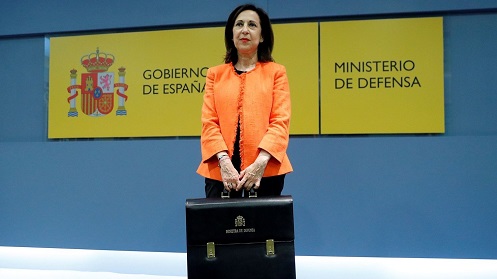After the recent change of government, we offer here an analysis on how Spain´s Defence policy could look like for the next two years. Prime Minister Pedro Sánchez has declared he will stay on until the end of his mandate in 2020 and will not hold early elections, which forces him to keep weak alliances with minority in parliament. In this scenario, Defence strategic affairs will be extremely uncomfortable.
The starting point is a socialist executive with 84 deputies (to pass any draft bill or initiative it will need to reach 176 votes), some populist and nationalist parliamentary partners with strong opposite interests, a Bureau of Congress against, and a minority in Senate. The current government is the unexpected outcome of a no-confidence motion, and has caused a halt or a possible modification of important topics related to Defence with a priority agenda at a limit situation, as the Chief of Defence Staff (JEMAD) stated during the State General Budget debate.
After a presentation week of the new team, of the expansion of ministerial portfolios and promises of reforms, a successful aesthetic perception of change has given way to concern. Facing the reality of the geopolitical landscape and conflicts will mean bad news in La Moncloa and will be used in Parliament, by some or by others, for the next electoral appointment or the marketing of regional competitions. We should remember that those who have favoured the change of government are political parties that have a pro-independence, nationalist or openly political project against national identity, which implies a null interest in defence issues, that is, exercise of sovereignty, the indissoluble unity of Spain, and a sense of State to safeguard and promote our interests.
In his first speech, Pedro Sánchez announced that «Europe is our homeland.» Leaving aside these poetic turns, in terms of loyalty, the narrative for the next two years will have as holder the Constitution, the Spaniards and the interest of his party, but will inevitably need to yield to the political demands of the Catalan independence movements (PDeCAT, Compromis and ERC), the Basque nationalism (PNV, EH Bildu) and the extreme left-wing populism (Unidos Podemos). Decisions on strategic security issues will become then an uncomfortable matter, will be strongly challenged by parliamentary partners and will need a compensation in order to move forward. The interest of the PSOE will try to ensure balance, strengthen the trust of its supporters and recover voters as the alternative to change, keeping an eye on the polls. Public opinion will become an essential tool to achieve a favourable perception. Defence issues do not give votes but they help to lose them.
It will not be easy for the Minister of Defence, Margarita Robles, despite having experience in the judicial and police matters, as under-secretary of Justice and Secretary for Home Affairs. To carry on with the work undertaken by the previous team will be a prudential and accurate criterion, essentially because the most relevant issues were well guided. These priorities are perfectly studied and suggested from multiple perspectives, and it responds to non-partisan criteria, but so that the Defence can fulfil the assigned missions, which are not only those of going abroad, parading on October 12 or appearing on TV as if it was an NGO. It will be needed to make the budgetary requirements effective to be able to keep a ministry afloat, in need of reforms for its modernization -including the personnel policy- and a new investment impulse in the medium-long term, looking to 2035.
In conclusion, the Defence policy of the next two years will not get to be effective if it does not get a minimum of consensus on the essential matters and if the right decisions are not taken to get out of a limit situation. Prime Minister Sánchez and Minister of Defence Robles will realize that our Armed Forces are exceptional. Contemporary threats have blurred the classification between inside-outside and security-defence. The Defence portfolio has its own life and should not be subordinated to either the Foreign or the Home Affairs. Nor to the criterion of politically correct from the point of view of the public opinion. Governing Spain means being subject to a concrete history and geographic location, not just a party endorsed by a handful of seats. To be a member of the Atlantic Alliance and the European Union has its consequences. Also to have the most unstable regional conflict in the world in our southern border (Sahel).
Gabriel Cortina, Diploma on Higher Studies on Security and Defence (CESEDEN)
Responsibility for the information and views set out in this publication lies entirely with the author.


